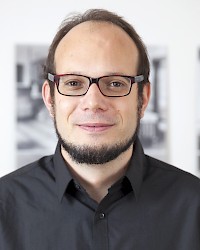Vita
Martin Ritter is Lecturer at the Faculty of Arts of Charles University, Prague, and Postdoctoral Researcher at the Institute of Philosophy of the Czech Academy of Sciences. His main areas of teaching and research are phenomenology, critical theory and 19th and 20th Century European philosophy. Martin Ritter focuses on Jan Patočka´s phenomenology and is a leading Czech expert on Walter Benjamin´s thinking. He edited and translated three volumes of the Selected Writings of Walter Benjamin and took part in editing Jan Patočka´s Collected Works. He translated other significant philosophical books into Czech including those written by Theodor Adorno, Homi Bhabha, Richart Rorty oder Slavoj Žižek.
Dated from 2017
Fields of research
Phenomenology
Critical Theory
19th and 20th Century European Philosophy
IKKM Research Project
Asubjective Appearing
In my project, I will examine whether, and how, phenomenology can be inspiring for media philosophy and vice versa. More concretely, based on my insights into the thought of Jan Patočka, I seek to (re)interpret his late asubjective phenomenology as a concept dealing with the problem of how human beings and things in the world inter-act in the asubjective field of appearing, i.e. in the field of mediality. Speaking of the necessity to make phenomenology asubjective, Patočka abandons Husserlʼs concept of absolute consciousness constituting the phenomenal field. The field of appearing is rather the field “of possible encounter with being” and is linked, as such, with a being that lives in possibilities. What I find especially interesting in Patočka’s approach, when connected to media theory, is its differentiating three fundamental movements of existence: the so-called movements of (1) anchoring, (2) self-extension, and (3) breakthrough. Any existent being must realize these three movements but no individual human being is the principle of them. Indeed, no individual being causes these movements, it rather participates in them insofar as these movements, in their historically variable formations, ontologically condition this being. One can say that what makes a human being a concrete person is how it participates in these movements in their historical variations. It is both the historical variability of these formations and the different “logics” of appearing, or of mediating, in each of the movements that can be analyzed using the media theoretical approach. As a matter of fact, the different movements imply not only different ways of appearing but also different cultural techniques and even different ways of their theoretical “capturing”. Whereas in the second movement, insofar as it is an (“ec onomic”) movement of sustaining life, one can meaningfully identify causation (Verursachen) as the way of appearing/mediating, in the case of the first movement, and even more so in the case of the third movement, it seems much more appropriate to connect its way of mediating/appearing with emerging or enacting (Sich-Zeigen).
Recent publications
"Patočka's Care of the Soul Reconsidered: Performing the Soul Through Movement", in: Human Studies, 40(2), 2017, pp. 233-247
"Towards a Non-Eurocentric Analysis of the World Crisis: Reconsidering Patočka’s Approach", in: Research in Phenomenology, 2017 (forthcoming)
Benjamin, Walter, Výbor z díla III, Psaní vzpomínání [Selected Writings III], Oikúmené, Praha 2016 (edition and translation)
